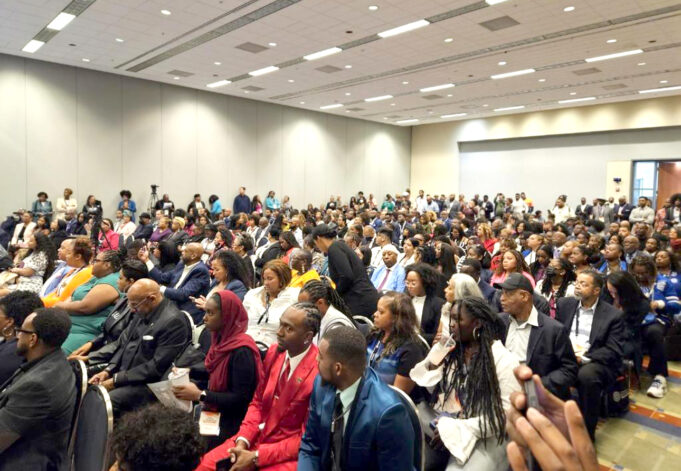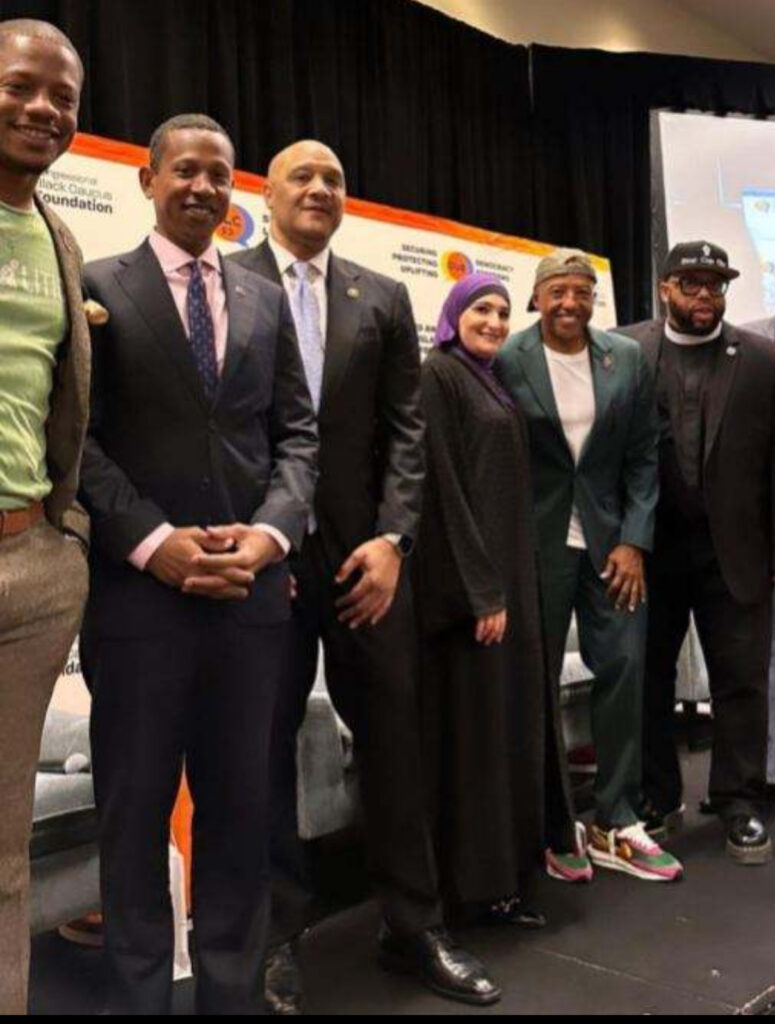WASHINGTON, D.C.—It was CBC Week in the nation’s capital. The 52nd Congressional Black Caucus Foundation’s Annual Legislative Conference (ALC) brought together a who’s who of the best and brightest in Black America. This year’s theme was: “Securing Our Democracy. Protecting Our Freedoms. Uplifting Our Culture.”

The Annual Legislative Conference is widely recognized as the nation’s premier policy forum on issues affecting Blacks in America and the global Black community.
It was a week filled with more than 140 sessions, ranging from international affairs to the plight of Black farmers. The gathering featured multiple special events like the Black Press Salute to Black Excellence Awards, a screening of the documentary “Bobi Wine: The People’s President” about Uganda’s musician/politician Bobi Wine, and networking opportunities for attendees from all over the country and the world.
Representative Stacey Plaskett (D-Virgin Islands), and U.S. Senator Reverend Raphael Warnock, were this year’s Honorary ALC Co-Chairs. Nicole Austin-Hillery is the Congressional Black Caucus Foundation President and CEO. Rep. Terri A. Sewell (D-Ala.) is Chair of the CBCF’s Board of Directors. Rep. Steven Horsford (D-Nev.) is Chair of the Congressional Black Caucus (CBC).
The week kicked off with a national town hall focused on examining censorship, disinformation, and voter suppression. The town hall was moderated by author and public speaker Dr. Michael Eric Dyson, who used hip-hop references to explain the challenges facing Black people. “We are living in the midst of a crisis,” he said.
Senator Warnock called this year’s event, held September 20-24, a “family reunion” and “a call to action fortified by thought-provoking discussion.” He joined New York Attorney General Letitia James, civil rights advocate and scholar Kimberlé Crenshaw and others on a panel about race and racial equity.
Perhaps the most highly anticipated and relevant sessions both involved hip hop as a cultural influence and political catalyst. One was “50 Years and Still Going: Hip Hop’s Struggle Against Mass Incarceration and the Criminal Legal System.” The Hip Hop Caucus confronted the long-term impact of the “War on Drugs” from the early ‘90s and highlighted efforts by activists to prevent the formation of what is referred to as “Cop City” in Atlanta, Georgia.
In the session titled “Hip Hop and Politics: Activism, Culture, Revolution and Entrepreneurship,” presented by Rep. Andre Carson (D-Ind.), Grammy-winning hip hop artist Shyne Barrow, now a member of the Belizean House of Representatives, told the crowd of his plans to ultimately become prime minister. He has used his experience in hip hop to impact the creative community in Belize serving as the Ambassador of Culture for the Government of Belize.
“We have to find our own candidates for the Senate, for the House, local politics like the sheriffs. All these people are making decisions that impact the most vulnerable amongst us. We need to find our own candidates and we have to maintain our integrity.
Hip hop is not for sale. Some of these artists and some of these people are making deals with treacherous, despicable human beings that are a detriment to humanity. Not just Black America, not just White America or Latin America, but to humanity. One thing hip hop never did was sell out, “ said Mr. Barrow.
“We need to keep our integrity. We need to create our candidates. If we’re not satisfied with the candidate, we need to create our candidates. I’m not telling you to be a Democrat,” he told the audience. “We could demand the policies that we want and find the candidates. We have the money. We can finance our own candidates to make the implementation of policies that we need.”
Mr. Barrow explained that when he talks to artists about their actions like meeting with a Republican president the artist’s response is often that they are all about the money. “I’m like, you’re driving a Rolls Royce and you’re flying a private plane, but you know, there’s still police officers that are going to assassinate you because of the policies of that president and the climate and the hostility that they created for people that look like you. We can’t be for sale.
“If you don’t like the two presidential candidates or you don’t like the Republicans or the Democrats, let’s create our own party.”
In the 2020 presidential election, just 43 percent of Black young adults ages 18-29 voted, and in the 2022 midterms, just 11.2 percent cast votes at the polls, according to CBCF officials.
Social justice activist Linda Sarsour, co-founder of the first Muslim online organizing platform, MPower Change, and co-founder of Until Freedom, was also a panelist at the forum on hip hop and politics. She spoke on the deglorification of violence in hip hop. “One of the most dangerous trends that people are not really paying attention to is prosecutors across the country.
Some of them are Black prosecutors who are using rap lyrics to criminalize people in our communities, who are charging people based on words and not in fact actions. We need to be really careful about not allowing 50 years after hip hop (for) this to happen. Hip hop for someone like me from Brooklyn, was an opportunity to walk in the shoes of other people that I may not be like. It was storytelling,” said Ms. Sarsour.
“It allowed us to understand the war on drugs and the impacts that it had on Black and Brown people. It allowed us to understand the struggles of Black people in communities like where I’m from in Brooklyn. It was an opportunity to go inside communities that we were not from. It actually evolved into the opportunity of activism and getting people to understand how do we make change, how do we transform, how do we talk about manhood?”
Thirteen Black members of Congress in 1971officially formed the Congressional Black Caucus (CBC). That group included Rep. Charles Diggs (D-Mich.), Rep. Shirley Chisholm (D-NY), Rep. William L. Clay Sr. (D-Mo.), Rep. Collins (D-Ill.), Rep. John Conyers (D-Mich.), Rep. Ronald V. Dellums (D-Calif.), Rep. Charles B. Rangel (D-NY), Rep. Louis B. Stokes (D-OH) and D.C. Del. Walter Fauntroy (D).
This year’s conference concluded with the “Day of Healing” prayer breakfast and the legendary Phoenix Awards, an elegant formal event highlighting the accomplishments of community activists and elected officials.














